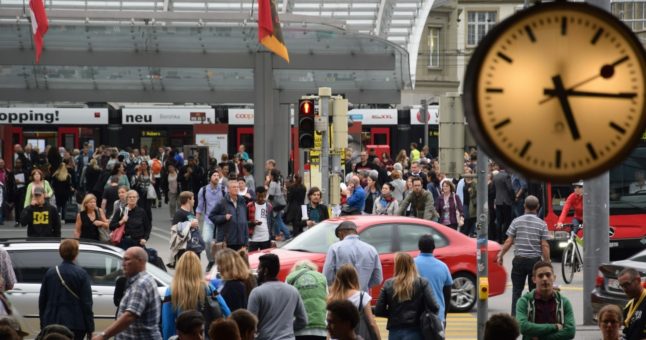Switzerland’s median salary increases
The median salary for a full-time position is 6,788 francs gross per month — up from 6,665 previously, according to the Federal Statistical Office (FSO).
It also noted that that 10 percent of the lowest-paid employees earn less than 4,487 francs per month, while the 10 percent of best-paid workers have a monthly salary of more than 12,178 francs.
Sectors with the highest pay are banking (10,491 francs), the pharmaceutical industry (10,296 francs, and IT (9,412 francs).
At the bottom of the salary pyramid, there is the retail sector (5,095 francs), restaurants (4,601 francs), and hotels (4,572 francs).
READ ALSO: Just how ‘rich’ is Switzerland’s middle class?
In many cantons, English is the most widespread ‘foreign’ language
Even though English is not one of Switzerland’s four official languages, it is nevertheless widely spoken in a number of cantons, to the detriment of other national languages.
This is the finding of a new study published by the Federal Statistical Office (FSO).
Its data shows that English is the most prevalent foreign language in Switzerland.
In French-speaking Geneva, for instance, 11.8 percent of the population speak English — more than 5.7 percent who speak Italian. And in the neighbouring Vaud, 9.1 percent of residents speak English, versus 4.9 percent for both German and French.
In Zurich, where the predominant language is German,10.8 percent speak English, versus only 5.8 percent for Italian and 3.2 percent French.
This phenomenon has been observed in 20 out of Switzerland’s 26 cantons.
READ ALSO: Can you get by in Switzerland with just English?
The Swiss are ‘happy tenants,” research shows
Although many of the country’s regions are in the throes of an acute housing shortage, and rents are steadily increasing, overall, tenants in Switzerland are mostly happy about their accommodations.
“The Swiss are happy tenants,” according to researcher Lukas Golder, author of a study by gfs.bern institute released on Tuesday. “More than 70 percent of those questioned say they are satisfied with their [housing] situation” and want to remain where they are.
But market tensions are also reflected in the survey. Specifically, the price of the rented property is the top priority for 46 percent of tenants, with other criteria, like the neighbourhood or the proximity to public transportation, a less important consideration.
READ ALSO: Rent prices and living space: Where in Switzerland has the best deal?
Goodbye winter, hello spring
Today, March 20th, is the first day of the spring season, the so-called Vernal Equinox, though you have probably slept through it, as it occurred at precisely 4:06 am.
That was when the sun sat vertically above the equator, making day and night equally long/short.
If you have any questions about life in Switzerland, ideas for articles or news tips for The Local, please get in touch with us at [email protected]



 Please whitelist us to continue reading.
Please whitelist us to continue reading.
Member comments